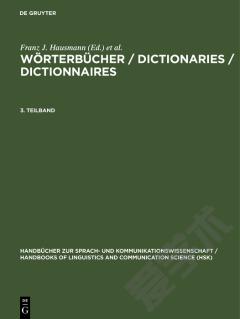Woerterbuecher/Dict.3 (Hausmann U.A.)Hsk5.3 E-Book
Since about 4000 years ago, lexicography has been a component of all cultures in which script was known. The path of its development goes from word lists on clay tablets to computer stored data banks. In our day, lexicography has a scientific and a non-scientific form. The former form comprises works on various sources of information and reference that pursue various important purposes, such as: help in the acquisition of the mother tongue and of foreign languages; in various types of acquisition of scientific and technical knowledge; in translation; and in cultural exchange and in ideological developments, either within one`s own or in a foreign linguistic community. The social importance of lexicography is occasionally taken cognizance of even in international politics. The last two decades have witnessed an upsurge in interest in lexicography. On the one hand, international contacts are becoming more intimate in terms both of culture and economy; on the other hand and as far as scientific considerations go, the lexicon is being studied more within the framework of various theories, problems of the vocabulary are being studied within the area of foreign language teaching, and the application of the computer in lexicography and in other fields has brought new problems, together with many advantages. The increase in interest in the lexicon has been accompanied by the emergence of the study of dictionaries as a scientific discipline.
{{comment.content}}








 京公网安备 11010802027623号
京公网安备 11010802027623号